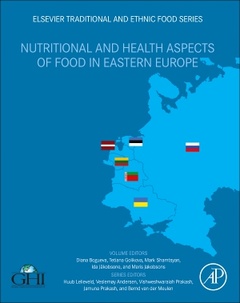Nutritional and Health Aspects of Food in Eastern Europe Nutritional and Health Aspects of Traditional and Ethnic Foods Series
Coordonnateurs : Golikova Tetiana, Bogueva Diana, Shamtsyan Mark, Jakobsone Ida, Jakobsons Maris

Nutritional and Health Aspects of Food in Eastern Europe provides an analysis of traditional and ethnic foods from Eastern Europe, including selections from Russia, Belarus, Ukraine, Estonia, Latvia and Lithuania. The book addresses history of use, origin, composition and preparation, ingredient origin, nutritional aspects, and the effects on health for various foods and food products in each of these countries. In addition, it presents both local and international regulations, while also providing suggestions on how to harmonize these regulations to promote global availability of these foods.
1. Introduction, describing why this book has been produced 2. History of eating habits in Eastern Europe 3. Eastern food cultures and traditions 4. Food, nutrition and health in Russia 5. Food, nutrition and health in Belarus 6. Food, nutrition and health in Ukraine 7. Food, nutrition and health in Estonia 8. Food, nutrition and health in Latvia 9. Food, nutrition and health in Lithuania 10. Common nutrition and health issues 11. Environmental sustainability issues for eastern food production 12. Common regulatory issues 13. Proposals to harmonize regulations 14. Future outlook
researchers, professionals (including nutritionists, dieticians, food scientists, food technologists, toxicologists, regulators, and product developers), educators, and students
She has more than 70 research papers to her credit including publications at European Food congresses of EFFoST and ISEKI_Food. She is on the Editorial Board of Food Safety Magazine. She is an author of the study guide “Culinary ethnology edited by NUFT (in press).
Diana is an interdisciplinary researcher with varied interests in food consumption issues related to the global consequences of human nutritional habits, especially global meat consumption, alternative proteins, novel food processing technologies including non-thermal, behavioural and attitudinal change, environmental sustainability and food harmonization. She has a PhD in Humanities specialised in Food Sustainability from Curtin University, Perth, Australia. Currently she is a Centre Manager of the Centre for Advanced Food Engineering at the University of Sydney and Research Fellow with Curtin University’s Sustainability Policy (CUSP) Institute.
Diana’s books have won three awards: the Australian National Best Book winner in 2019 and the World’s Best Book award 2020 in the Vegetarian book category from the Gourmand Awards, who also recognized her co-edited book ‘Environmental, Health and Business Opportunities in the New Meat Alternatives Market’.
Mark Shamtsyan is professor at the St. Petersburg State Institute of Technology (Technical University), consultant of Taiyo Kagaku Co., Ltd. (Japan), president of RUSFoST, chair of Russian section of EHEDG and GHI amba
- Analyzes nutritional and health claims relating to Eastern European foods
- Includes traditional and ethnic foods from Russia, Belarus, Ukraine, Estonia, Latvia and Lithuania
- Explores both scientific and anecdotal diet-based health claims
- Examines if foods meet regulatory requirements and how to remedy non-compliance
- Reviews the influence of historical eating habits on today’s diets
Date de parution : 09-2021
Ouvrage de 298 p.
19x23.4 cm
Thème de Nutritional and Health Aspects of Food in Eastern Europe :
Mots-clés :
Adygeis; Agricultural development; Agriculture; Atmospheric pollution; Bakery food; Belarus kitchen; Belarus; Belarusian cuisine; Chechen; Circassians; Consumption; Cooking traditions; Culinary heritage; Culinary traditions; Culture; Diet; Diseases; Eastern European countries; Eastern European; Estonian food; European Union; Food industry; Food legislation; Food products; Food; Health; Historical overview; Household budget survey; Implementation; Ingush; Kabardino-balkaria; Karachai people; Latvia; Lithuanian food; Meat dishes; Milk food; Milk; North Caucasus; Nutrients; Nutrition; Nutritional composition; Old culinary traditions; Ossetians; Population; Production; Russia; Sustainable development; Sweet baked foods; Tatar cuisine; Traditional food; Traditional method; Traditions; Ukraine; Wastewater treatment



